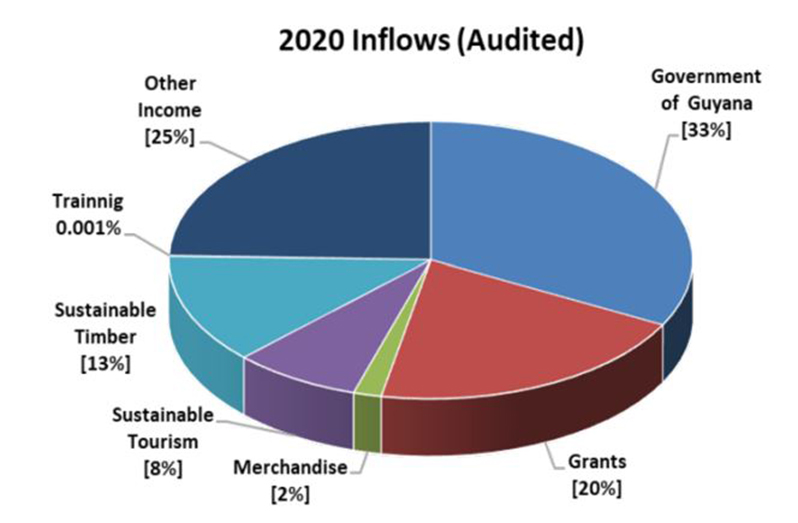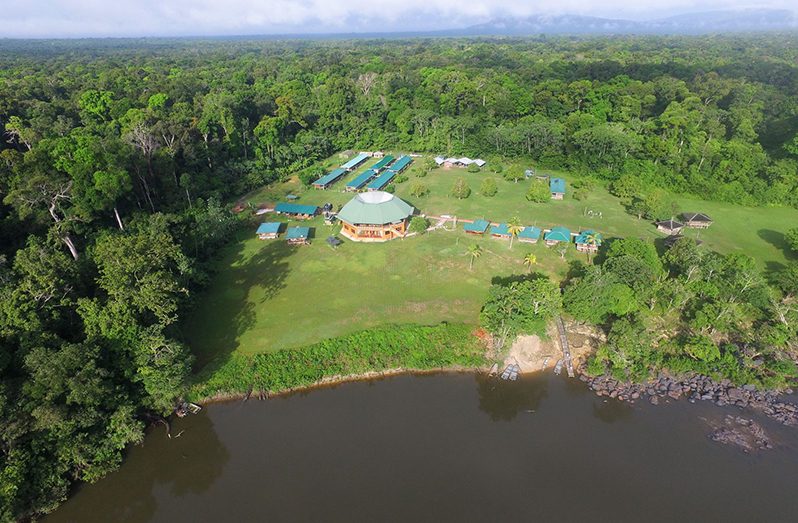“LIKE many organisations globally, the COVID-19 pandemic had a significant impact on Iwokrama’s field operations, substantially affecting revenues,” said Dane Gobin, Chief Executive Officer (CEO) of Iwokrama’s International Centre.
He said that even though the centre’s operations were closed in April and most of 2020 was plagued with production and demand challenges due to travel restrictions, the Iwokrama team was still able to deliver some of its key outputs.
“We were able to continue our biodiversity research project in partnership with Kent University and [the] University of Guyana, which includes a PhD scholarship, and the completion of some key research projects including Post Harvest Silvicultural Surveys and Permanent Sample Plots (PSPs),” Gobin said in his report.
He acknowledged that COVID-19 restrictions forced the centre to examine new ways of managing and promoting the forest. To this end, Iwokrama was able to partner with the Inter-American Development Bank (IDB) to produce a road map for a large-scale Virtual Reality (VR) project for Iwokrama and the North Rupununi, successfully producing a mini-VR game as the first step.
“Iwokrama also signed MoUs [Memorandum of Understanding] with Environmental Management Consultants, Guyana’s premier environmental consultants and the Guyana Meteorological Office for water quality and weather monitoring,” Gobin added.

He reminded that of all the sectors, tourism was most affected by the emergence of the coronavirus which quickly escalated to a pandemic. “Global travel restrictions continued to limit opportunities, which resulted in cancelled visits and low domestic visitation despite very attractive pricing and marketing initiatives,” Gobin indicated, adding that even research visits from students were forced into cancellation.
Gobin said that even with the notable “down-time”, work still continued to improve facilities and develop new opportunities at the centre, in anticipation of the opening of the travel market in 2021.
“The centre maintained its austerity programme and continued to seek additional funding in support of research and science. We expect that the sustainable businesses will continue to make substantive contributions to core operating costs, despite current global challenges,” the CEO hoped.
Gobin noted that even though COVID-19 severely affected Iwokrama’s operations, the centre was only able to deliver on its major plans, primarily owing to the support from the Government of Guyana and its partners.
Iwokrama’s audited financial report shows that 33 per cent of the centre’s income came from government support, while 20 per cent was a result of external grants. Further, 13 per cent of the centre’s inflow was as a result of sustainable timber, while sustainable tourism accounted for only eight per cent.
Specific to tourism, the report indicated that the Iwokrama River Lodge was closed from March 2020 to November 2020. During the months outside of that period, the facility attracted only 314 guests. It reopened in December 2020, after receiving conditional approval from the Guyana Tourism Authority (GTA). In keeping with strict guidelines instituted by the National COVID-19 Task Force, Iwokrama was required to develop a document outlining the facility’s Standard Operating Procedures (SOP)s, in keeping with COVID-19 protocols.
Further, the Iwokrama team said that it was able to develop new, shorter tours, conduct extensive repairs and maintenance to the Fred Allicock Building and one of its cabins, as well as clean and sanitise the entire Iwokrama complex.
As it relates to forestry, the report said that sustainable timber-harvesting operations were halted in March 2020, also owing to national COVID-19 restrictions.
“During the national lockdown, existing partners – FML/McV-Guyana opted to close operations in the Iwokrama Forest; the agreement was terminated in April. Iwokrama advertised for a new partner and got a preferred bidder – Evergreen Forest Products Inc., a 40-year-old company who has been supplying the United States with Guyana’s hardwoods for the past 15 years,” the report said. The new partnership agreement was subsequently signed in May, 2020.
A major component of Iwokrama’s work revolved around fighting illegal mining along the Siparuni River.
“Illegal mining activities increased in the forest during the year, as the COVID-19 pandemic resulted in reduced staffing and monitoring patrols. The miners took advantage of the reduced patrols and intensified their operations, employing the use of small dredges which caused significant damage, including the removal of trees,” the report noted.
Despite a number of joint efforts to curb the situation, illegal mining continues to be a challenge, with threats of activities moving beyond the buffer zones to possibly spread into the Iwokrama Forest itself.
“No mining is allowed in the buffer zone which serves to protect the Iwokrama Forest. The Ministry of Natural Resources and the police continue to give valuable support and increased monitoring and enforcement is expected to occur in 2021,” the report posited.





.jpg)








